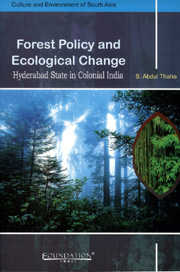Book contents
- Frontmatter
- Contents
- Dedication
- Preface
- Maps
- CHAPTER 1 Introduction
- CHAPTER 2 History of Forests
- CHAPTER 3 Evolution of Forest Policy
- CHAPTER 4 Forest Administration and Management
- CHAPTER 5 Development of Irrigation and its Influence on Forests
- CHAPTER 6 Famines vs. Forests
- CHAPTER 7 Conclusion
- Appendix
- Bibliography
- Index
CHAPTER 1 - Introduction
Published online by Cambridge University Press: 26 October 2011
- Frontmatter
- Contents
- Dedication
- Preface
- Maps
- CHAPTER 1 Introduction
- CHAPTER 2 History of Forests
- CHAPTER 3 Evolution of Forest Policy
- CHAPTER 4 Forest Administration and Management
- CHAPTER 5 Development of Irrigation and its Influence on Forests
- CHAPTER 6 Famines vs. Forests
- CHAPTER 7 Conclusion
- Appendix
- Bibliography
- Index
Summary
The management of the natural resources is important for the welfare of any country. In a predominantly rural country like India, where people are undoubtedly dependent upon their natural resource base for their sustenance, the management and utilization of natural resources like forests, land and water is crucial. As the increase in population and concomitant demands grow over control, use of natural resources makes resource-use patterns change. Though the government intervention was not unknown in the pre-British period, particularly from the nineteenth century onwards the natural resources have increasingly come under the control of the state.
Many historians have noticed the significance of the state as a leading, often the influential factor in shaping the policy towards the management of ecological resources of India. Particularly, the second half of the nineteenth century is considered to be a period of ‘remarkable interventionist policies; an age of high imperialism and supreme confidence in the capacity of science and technology to control nature and utilise it to the maximum extent’. During this period various problems associated with forests, like irrigation, famines, drought and epidemics became the centre of attention. Concern is expressed over the above said environmental issues by experts in various fields. These disturbances in the ecosystem have led several scholars to reconstruct history, using insights derived from recent debates on environmental issues. The historical study of forestry and forest policies is relatively a recent phenomenon and one of the positive results of such concern has been the emergence of environmental history as a distinct field in the historical writing.
- Type
- Chapter
- Information
- Forest Policy and Ecological ChangeHyderabad State in Colonial India, pp. 1 - 13Publisher: Foundation BooksPrint publication year: 2008



